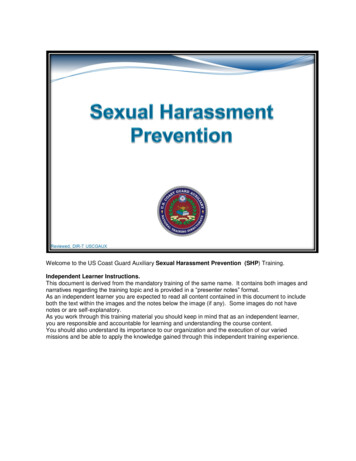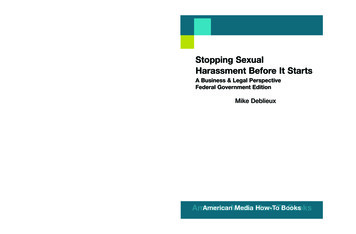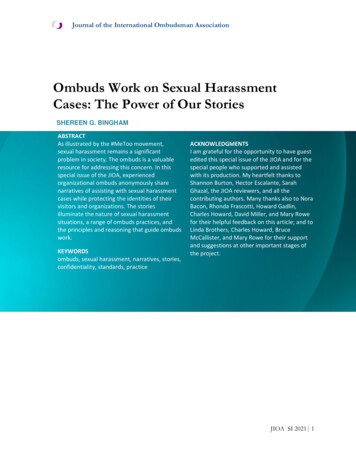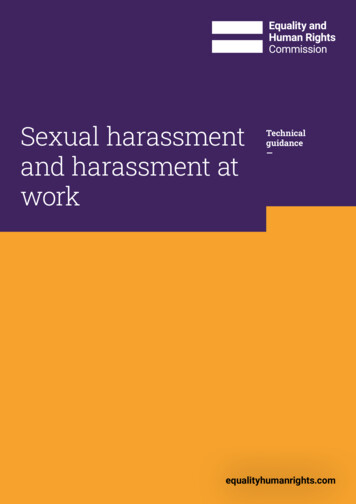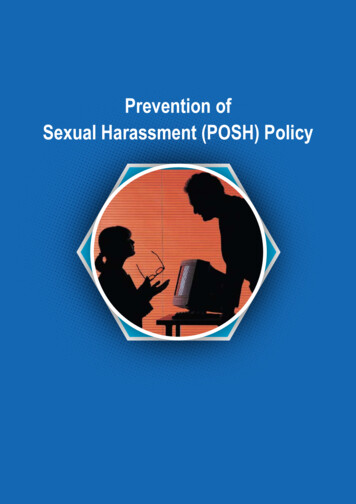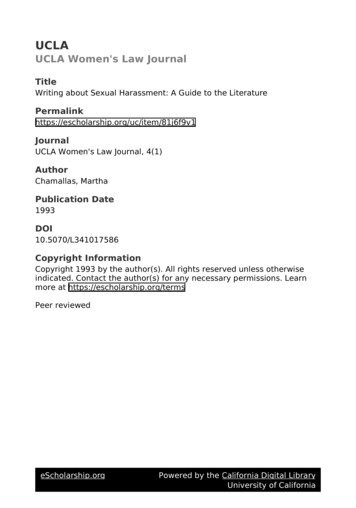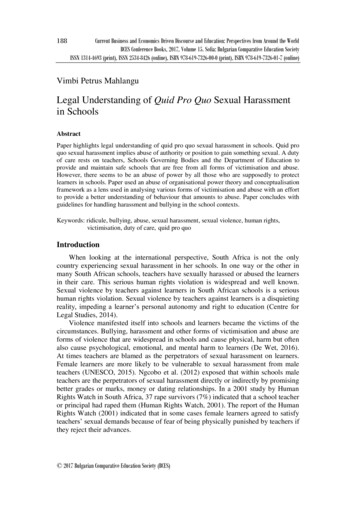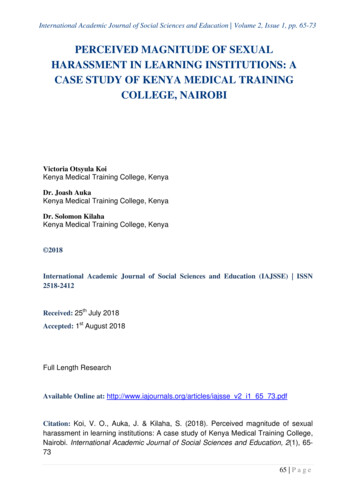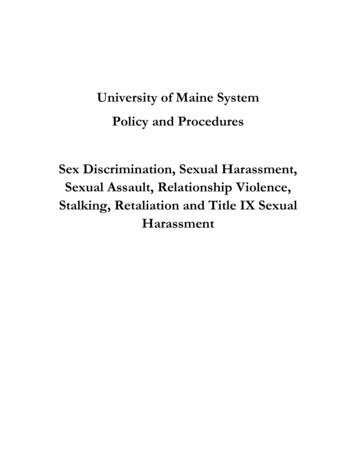
Transcription
University of Maine SystemPolicy and ProceduresSex Discrimination, Sexual Harassment,Sexual Assault, Relationship Violence,Stalking, Retaliation and Title IX SexualHarassment
Final Approved on 8/13/2020Table of ContentsI.Policy Statement2II.Overview2III.What to do if you are Sexually Assaulted or are the Victim of Domestic Violence, DatingViolence or Stalking3IV.Terms Used in this Policy4V.Consent8VI.How to File a Complaint and How the University Will Respond8VII.Confidentiality12VIII. Support Services186IX.Options Regarding Law Enforcement19187X.Enforcement of Protection-from-Harassment or Protection-from-Abuse Orders17XI.Student Amnesty18XII.Free Speech and Academic Freedom18XIII. Off-Campus and Off-Duty Conduct18XIV. Educational Programs19XV.External Complaints19XVI. Title IX Sexual Harassment20XVII. Review and Revision of this Policy24**Please note: The reader will find highlighted sections within this document. These sections arespecific to each campus; each campus will have a version of this policy that contains more detailed1
information specific to that campus. Contact the Deputy Title IX Coordinator on the campus ofinterest for this information; or the UMS Coordinator of Title IX Services at titleix@maine.eduI. Policy StatementThe University of Maine System (“UMS” or “the University”) is committed to providing a safeenvironment which promotes the dignity and worth of each member of the community. Incomplying with the letter and spirit of applicable laws and in pursuing its own goals of diversity, theUniversity does not discriminate on the basis of sex in employment, education, and all otherprograms and activities. UMS, inclusive of all its campuses and faculties, does notdiscriminate on the basis of sex, race, color, religion, age, disability, status as a veteran,national or ethnic origin, sexual orientation, transgender status, gender identity, gender expression,or any other category protected by applicable law, in the administration of its educationalpolicies, admission policies, scholarship and loan programs, employment, or other schooladministered programs. For this reason, the University will not tolerate sex discrimination, sexualharassment, sexual assault, dating violence, domestic violence, stalking, or retaliation in any form. Allconduct of this nature is considered a violation of this policy.This policy addresses discrimination on the basis of sex. UMS does not discriminate on the basis ofsex in its education programs or activities, and UMS is required by Title IX of the EducationAmendments of 1972, and the final Title IX regulations issued by the U.S. Department ofEducation’s Office for Civil Rights in May 2020, not to discriminate in such a manner. Therequirement not to discriminate on the basis of sex in the education program or activity extends toadmission and employment. Inquiries about the application of Title IX and its implementingregulations may be referred to the Title IX Coordinator, to the Assistant Secretary for Civil Rights,or both.The University will respond to complaints and reports of violations of this policy in a prompt, fair,impartial and equitable manner. Regardless of whether a complaint is filed, the University willrespond promptly and reasonably when it has notice of potential sexual misconduct that is coveredby this policy. The University will take steps to end and prevent recurrence of violations of thispolicy and to correct their discriminatory effects on the complainant and others when adetermination of responsibility has been made against a Respondent. In responding to all complaintsand reports, the University will act to ensure the safety of students, guests, and employees whilecomplying with state and federal laws and provisions of applicable collective bargaining agreementsand employee handbooks.II. OverviewThis policy applies to all members of the University community, including but not limited to allstudents (graduate and undergraduate), all employees (including faculty and staff), adjunct faculty,contractors, vendors and/or other third parties. This policy applies to all individuals regardless ofgender, sexual orientation, transgender status, gender identity, or gender expression. It applies to all2
University programs and activities, both on campus and off campus, including, but not limited to,instruction, grading, housing, athletics, electronic communication and employment.This policy does not substitute for or supersede related civil and criminal law. It is the policy of theUniversity to strongly encourage individuals to report all incidents and violations to law enforcementofficials or agencies with appropriate jurisdiction and to avail themselves of all the services andrights to which they are entitled.Any individual may file a complaint under this policy at any time. However, the University stronglyencourages individuals to file complaints promptly in order to preserve evidence for a potential legalor disciplinary proceeding. A delay in filing a complaint may compromise the subsequentinvestigation. Reporting in a timely way also allows the University to provide all persons involvedwith information regarding their rights, options, and resources available under this policy and federalor state laws.All members of the University community are encouraged to cooperate fully in investigations andother proceedings necessary for the effective execution of this policy, though no individual will beretaliated against for exercising their rights under this policy including their right not to participate inan investigation and/or adjudication process.This policy covers the following information: What to do if you are sexually assaulted or are the victim of domestic violence, datingviolence or stalking;Common terms used in this policy;Consent;How and where to file a complaint;How the University will respond to a complaint;Confidentiality;Supportive measures that are available;Options regarding reporting to Law Enforcement;Protection orders;Student Amnesty;Free Speech and Academic Freedom;Off-campus conduct;Educational programs;External complaints;Review and revision of this policy.III. What to do if you are Sexually Assaulted or Experience DomesticViolence, Dating Violence or Stalking3
IV.Get to a safe location. If you are a student and are unsure where to go or can think ofnowhere that is safe at this time, please consider calling your campus Public Safety orSecurity Department at 207-780-5211 and/or local law enforcement at 911. CampusResidence Life or Student Affairs staff can help with housing arrangements as well.Consider asking a trusted friend or relative to be with you for support.Seek medical care as soon as possible. You may need basic medical treatment for injuries,and you may have injuries of which you are unaware. You also may be at risk of acquiring asexually transmitted infection, and women may be at risk for pregnancy. Trained staff at yourcampus Health Center or the local emergency room can speak with you about all of themedical options available and provide information about a sexual assault forensicexamination.You may choose to file a report with the local law enforcement agency. Your report puts inplace support systems that you may choose to use. The University will provide someone toassist you in filing a report with Law Enforcement if you wish.Preserve all evidence of the incident. If you choose to file a report with the police, it isimportant that you:Do not bathe, wash your hands, brush your teeth, drink, eat, or even use the restroom—allthese things can destroy evidence that may be helpful in a criminal investigation; however, ifyou have done any of these things since the incident, evidence can still be collected;Do not clean or remove anything from the location where the incident occurred;Write down as much as you can recall about the incident and the people involved.Seek some form of emotional support. While taking care of your physical needs may be thefirst step in taking care of yourself, it is important not to neglect the emotions you may beexperiencing as a result of the assault, violence or stalking. University counseling serviceshave employees who are specially trained to assist students with recovery and healing.CIGNA EAP services are available for employees at 1.877.622.4327.It is your choice to determine when and in what manner you recover from your trauma.Give yourself the time you need and know that it is never too late to get help.KNOW THAT WHAT HAPPENED WAS NOT YOUR FAULT AND YOU ARE NOTALONE.For details about all of the available resources on your campus and in your community, seethe campus brochure regarding sexual assault, dating violence, domestic violence andstalking located at usm.maine.edu/campus-safety-project or usm.maine.edu/titleixTerms Used in this PolicySexual Harassment includes two distinct, but overlapping definitions applicable to this policy. TheTitle IX Regulations define sexual harassment as set forth in Section XVI of this policy. Consistentwith Title VII of the Civil Rights Act of 1964 and the recognition that Sexual Harassment may alsooccur in a wider variety of contexts, UMS defines Sexual Harassment as:4
A. Sexual HarassmentSexual harassment includes unwelcome sexual advances, requests for sexual favors, and other verbalor physical conduct of a sexual nature, including sexual assault and sexual violence. Sexualharassment, including sexual assault, can involve persons of the same or opposite sex. Consistentwith the law, this policy prohibits two types of sexual harassment:1. Tangible Employment or Educational Action (quid pro quo): This type of sexual harassmentoccurs when the terms or conditions of employment, educational benefits, academic grades oropportunities, living environment or participation in a University activity are made an explicit orimplicit condition of submission to or rejection of unwelcome sexual advances or requests forsexual favors, or such submission or rejection is a factor in decisions affecting an individual’semployment, education, living environment, or participation in a University program or activity.Generally, a person who engages in this type of sexual harassment is an agent or employee withsome authority conferred by the University.2. Hostile Environment: Sexual harassment that creates a hostile environment is based on sex andexists when the harassment:i.ii.Is subjectively and objectively offensive; andIs so severe or pervasive as to alter the conditions of a person’s employment, education orliving situation that it creates an abusive working, educational or living environment.A hostile environment can be created by anyone involved in a University program or activity, suchas an administrator, faculty or staff member, student, or campus guest. Offensiveness alone is notenough to create a hostile environment. Although repeated incidents increase the likelihood that ahostile environment has been created, a single serious incident, such as a sexual assault, can besufficient.Determining whether conduct creates a hostile environment depends not only on whether theconduct was unwelcome to the person who feels harassed, but also whether a reasonable person in asimilar situation would have perceived the conduct as objectively offensive. The following factorswill also be considered:a. the frequency, nature and severity of the conduct;b. whether the conduct was physically threatening;c. the effect of the conduct on the Complainant’s mental oremotional state;d. whether the conduct was directed at more than one person;e. whether the conduct arose in the context of other discriminatory conduct;f. whether the conduct altered the conditions of the Complainant’s educational or workperformance and/or UMS programs or activities;g. whether the conduct implicates academic freedom or protected speech; and,5
h. other relevant factors that may arise from consideration of the reported facts andcircumstances.B. Sexual AssaultSexual assault means an offense that meets the definition of rape, fondling, incest, or statutory rape.Rape is the penetration, no matter how slight, of the vagina or anus with any body part or object, ororal penetration by a sex organ of another person, without the consent of the victim.Fondling is the touching of the private body parts of another person for the purpose of sexualgratification, without the consent of the victim, including instances where the victim is incapable ofgiving consent because of his/her age or because of his/her temporary or permanent mentalincapacity.Incest is sexual intercourse between persons who are related to each other within the degreeswherein marriage is prohibited by law.Statutory rape is sexual intercourse with a person who is under the statutory age of consent. Allforms of sexual assault and sexual contact prohibited by Maine law are also included.C. Dating ViolenceDating violence is violence committed against a person by an individual who is or has been in asocial relationship of a romantic or intimate nature with that person. Whether a dating relationshipexists is determined based on the reporting party’s statement and with consideration of the length ofthe relationship, the type of relationship, and the frequency of interaction between the personsinvolved in the relationship. Dating violence includes, but is not limited to, sexual or physical abuseor the threat of such abuse. Dating violence does not include acts covered under the definition ofdomestic violence. All forms of dating violence prohibited by Maine law are also included (seeAssault.D. Domestic ViolenceA felony or misdemeanor crime of violence committed—(A) By a current or former spouse or intimate partner of the victim;(B) By a person with whom the victim shares a child in common;(C) By a person who is cohabitating with, or has cohabitated with, the victim as a spouse or intimatepartner;(D) By a person similarly situated to a spouse of the victim under the domestic or family violencelaws of the jurisdiction in which the crime of violence occurred, or6
(E) By any other person against an adult or youth victim who is protected from that person's actsunder the domestic or family violence laws of the jurisdiction in which the crime of violenceoccurred.All forms of domestic violence prohibited by Maine law are also included (see Domestic ViolenceAssault, Domestic Violence Criminal Threatening, Domestic Violence Terrorizing, DomesticViolence Stalking, and Domestic Violence Reckless Conduct).E. StalkingStalking is engaging in a course of conduct directed at a specific person that would cause areasonable person to—(A) Fear for the person's safety or the safety of others; or(B) Suffer substantial emotional distress.(ii) For the purposes of this definition—(A) Course of conduct means two or more acts, including, but not limited to, acts in which the stalkerdirectly, indirectly, or through third parties, by any action, method, device, or means, follows,monitors, observes, surveils, threatens, or communicates to or about a person, or interferes with aperson's property.(B) Reasonable person means a reasonable person under similar circumstances and with similaridentities to the victim.(C) Substantial emotional distress means significant mental suffering or anguish that may, but does notnecessarily, require medical or other professional treatment or counseling.All forms of stalking prohibited by Maine law are also included (Stalking and Domestic ViolenceStalking).F. RetaliationRetaliation is action taken by the University or any individual or group against any person foropposing any practices forbidden under this policy or for filing a complaint, testifying, assisting, orparticipating in an investigation or proceeding under this policy. This includes action taken against abystander who intervened to stop or attempt to stop a violation of this policy. Retaliation includesintimidating, threatening, coercing, or in any way discriminating against an individual because of theindividual’s complaint, participation or non-participation. Action is generally deemed retaliatory if itwould deter a reasonable person in the same circumstances from opposing practices prohibited bythis policy.G. Sexual Misconduct7
Sexual misconduct includes, but is not limited to, prostituting another person, nonconsensual imagecapturing of sexual activity, presentation or unauthorized viewing of a nonconsensual videotaping ofsexual activity, letting others watch you have sex without the knowledge or consent of your sexualpartner, possession of child pornography, peeping tommery, and/or knowingly transmitting anSTD or HIV to another person. Sexual misconduct may constitute sexual harassment. All forms ofsexual misconduct prohibited by Maine law are also included (see Violation of Privacy, Possession ofSexually Explicit Material, and Sex Trafficking).V. ConsentConsent is a voluntary agreement to engage in sexual contact. Consent must be informed, freely andactively given, and consist of a mutually agreeable and understandable exchange of words or actions.Consent is clear, knowing and voluntary Consent is active, not passive. Consent may be withdrawnat any time. Silence, in and of itself, cannot be interpreted as consent. Consent can be given bywords or actions, as long as those words or actions create mutually understandable clear permissionregarding willingness to engage in (and conditions of) sexual activity. Past consent does not implyfuture consent. Consent to engage in one form of sexual activity does not imply consent to engagein any other sexual activity. Consent to engage in sexual activity with one person does not implyconsent to engage in sexual activity with any other person.It is not consent when the exchange involves unwanted physical force, coercion, intimidation,and/or threats. If an individual is mentally or physically incapacitated or impaired such that onecannot understand the fact, nature or extent of the sexual situation, and the incapacitation orimpairment is known or should be known to the other person, there is no consent. This includesconditions resulting from alcohol or drug consumption, or being asleep or unconscious. Consent isnot valid if the person is too young to consent to sexual activity under Maine law.VI. How to File a Complaint and How the University Will RespondThe University strongly encourages anyone who has experienced sex discrimination, sexualharassment, retaliation, sexual assault, domestic violence, dating violence or stalking to report theincident to the appropriate contact at the University (see VI (A)). A report can be made under thispolicy at any time, regardless of when the incident happened. Reporting the incident to theUniversity does not mean that you have to file a formal complaint or bring criminal charges.Reporting the incident, however, will allow the University to provide individuals involved withinformation about available support and services, both on campus and off campus.Any individual may make a third-party complaint about a violation of this policy. Individuals areencouraged to contact the appropriate office identified below as soon as possible. After receiving acomplaint, the University will determine what further action, including contacting the alleged victim,is warranted. If a concern is reported by someone other than the alleged victim and the allegedvictim is unwilling or unable to cooperate with an investigation, the University’s ability to respondmay be significantly limited.8
The UMS Title IX Coordinator is responsible for the University’s overall compliance and responseto incidents of sexual assault, sexual harassment and sex discrimination in general.A. How and Where to File a Complaint1. Complaints or Reports of Employees’ ConductAll complaints or reports relating to violations of this policy by a University employee should bemade to the UMS Title IX Coordinator at 207.581.5866 or titleix@maine.edu or to the EqualOpportunity Office at 207.581.1226 or equal.opportunity@maine.eduUpon receiving a complaint or report of a violation of this policy by a University employee, theUMS Title IX Coordinator will assess the complaint or report and will follow the proceduresdescribed in the University of Maine System Equal Opportunity Complaint Procedure or the TitleIX Sexual Harassment Procedure. The UMS Title IX Coordinator will provide the complainantwith information about options for filing a formal complaint and explain the formal investigationand grievance process, supportive measures, and any options of informal resolution. The UMS TitleIX Coordinator will provide the complainant with a written explanation of the complainant’s rights,options, and supportive measures. Supportive measures are available to complainants even if they donot file a formal complaint. When a formal complaint is investigated, the University will use apreponderance of the evidence standard – whether it is more likely than not that the allegedviolation occurred. For more information about the Equal Opportunity Complaint Procedure,follow this link: nt-procedure/ For more information about the Title IX SexualHarassment Process, follow the link in Article XVI(4) of this Policy.2. Complaints or Reports of Students’ ConductAll complaints or reports relating to violations of this policy by a University student should be madeto the campus Deputy Title IX Coordinator who will notify the UMS Title IX Coordinator of thecomplaint or report. At the University of Southern Maine, the Deputy Coordinator is Sarah E.Holmes, Assistant Dean of Students and Deputy Title IX Coordinator, Email:usm.titleix@maine.edu, Phone: 207-780-5767.Upon receiving a complaint or report of a violation of this policy by a University student, theDeputy Title IX Coordinator/Title IX Coordinator will assess the complaint or report and followthe procedures described in the University of Maine System Student Conduct Code or the Title IXSexual Harassment Process. The Deputy Title IX Coordinator/Title IX Coordinator will providethe complainant with information about options for filing a formal complaint and explain the formalinvestigation and grievance process, offer supportive measures, and explain any options of informalresolution. The Deputy Title IX Coordinator/Title IX Coordinator will provide the complainantwith a written explanation of the complainant’s rights and options. When a formal complaint isdecided, the University will use a preponderance of the evidence standard – whether it is more likelythan not that the alleged violation occurred. For more information about the procedure for9
adjudicating complaint against students, see the UMS Student Conduct Code manual/section-501/ or the Title IX SexualHarassment Process at https://www.maine.edu3. Complaints or Reports of Third Parties’ Conduct (Campus Guests, Vendors, Contractors,etc.)All concerns regarding violations of this policy by third parties such as vendors, contractors andcampus guests should be made to the UMS Title IX Coordinator at 207.581.5866 ortitleix@maine.edu or to the Equal Opportunity Office at 207.581.1226 orequal.opportunity@maine.eduUpon receipt of a report or complaint, the University will respond appropriately depending on thenature of its relationship to the third party.B. How the University Will Respond to a ComplaintThe University’s investigation and decision-making process is separate from any criminal or civilinvestigation and adjudication regarding the same incident.The University will provide a prompt, fair, impartial, and equitable investigation and resolution ofthe complaint. The investigation and decision-making shall be conducted by officials who receiveannual training on discrimination, harassment, retaliation, domestic violence, dating violence, sexualassault, and stalking, and how to conduct an investigation and hearing process that protects thesafety of all individuals and promotes accountability.Both the complainant and the respondent have the right to have another present during anyinvestigative or disciplinary meeting or proceeding, including the opportunity to be accompanied toany related meeting or proceeding by an advisor of their choice, who may be, but is not required tobe, an attorney. The University will not limit the choice or presence of an advisor for either thecomplainant or respondent in any meeting or grievance proceeding; however, the University mayestablish restrictions regarding the extent to which the advisor may participate in the meetings orproceedings, as long as the restrictions apply equally to both parties.In investigating allegations covered by the Policy, the investigator and decision-makers will notquestion the complainant about the complainant’s prior sexual conduct with anyone other than therespondent unless relevant to establish that someone else committed the conduct alleged to be aviolation of this policy. Information regarding any prior sexual conduct or dating relationshipbetween the complainant and the respondent by itself shall not imply consent or preclude a findingof a violation, but may be relevant to understand the nature and context of the parties’ relationshipand how consent to sexual activity was communicated between the parties. No direct questioning ofthe either party by the other will be permitted, though as set forth in the Title IX sexual harassmentprocess, the parties’ advisors have the opportunity to cross-examine the other party and witnessesduring the hearing process.10
The respondent’s use of alcohol and other drugs in connection with a violation of this policy doesnot mitigate accountability for the behavior or diminish the seriousness of the incident, unless it isdetermined that the respondent was incapacitated and unable to consent to the sexual activity atissue. The respondent’s intentional use of a substance to affect an individual in order to facilitate aviolation of this policy will be considered relevant when determining responsibility and appropriatesanctions.In the investigation and decision-making processes for all complaints of sexual assault, domesticviolence, dating violence or stalking made under this policy, both the complainant and therespondent shall be simultaneously informed, in writing, of: (1) the outcome of any institutionaldisciplinary proceeding that arises from the alleged violation including all sanctions and the rationalefor the result and sanctions; (2) the procedure for the respondent and the complainant to appeal theresults of the institutional disciplinary proceeding; (3) any change to the results that occurs prior tothe time that the results become final; and (4) when the results are final. The University shall notrequire a party to abide by a non-disclosure agreement in writing or otherwise regarding the finalresults of the institutional disciplinary proceeding.Any student or employee found to have violated this policy may be subject to disciplinary action, upto and including suspension or dismissal/termination from the University. Sanctions for third partieswho violate this policy will be in accordance with the circumstances.For information about sanctions, students should refer to the Student Conduct Code manual/section-501/. All of the possiblesanctions that the University may impose upon a student following the results of any Universitydisciplinary proceeding for an allegation of dating violence, domestic violence, sexual assault orstalking are:A. Assigned Educational Projects: This may include research projects, reflective essays, counselingassessments, sanction seminars or other related assignments intended to promote learning.B. Community Service: The type of service may be related to the nature of the violation.C. Deferred Sanction: A specific period of time during which a Respondent’s continued enrollment orhousing contract at the University is clearly in jeopardy. Any further violation of the Code during thattime will minimally result in the imposition of the deferred sanction and any additional sanctionsdeemed necessary.D. Disciplinary Dismissal: Permanent separation (subject to the right of review after five years) fromthe University.E. Disciplinary Probation: A period of time when a Respondent is under closer scrutiny of theUniversity. It may include the loss of one or more privileges.F. Disciplinary Suspension: Separation from the University for a stated period of time and/or until astated condition(s) is met.11
G. Fine: Payment of money. Respondents who are unable to pay may discuss alternate paymentarrangements.H. Loss of Contact with a Specific Person(s): With this sanction, the person may not initiate direct orindirect contact with a specified person(s).I.Loss of Visitation Privileges: This loss of visitation may be to any designated area(s) of campus.J.Official Warning: Official acknowledgment of a violation and the expectation that it will not berepeated.K. Removal from University Housing: Removal from a particular hall or all housing.L. Restitution: Restitution, up to the replacement value of the items damaged, stolen, removed or usedwithout authority and damages incurred.M. Such other action as the Committee or Officer may reasonably deem appropriate (e.g.,suspension of an organization’s official campus recognition or suspension of a student froman extracurricular activity).For information about possible disciplinary action, represented employees should refer to theappropriate collective bargaining agreement. Non-represented employees should refer to the nonrepresented employee handbook. All of the possible sanctions that the University may impose uponan employee following the results of any University disciplinary proceeding for an allegation ofdating v
X. Enforcement of Protection-from-Harassment or Protection-from-Abuse Orders 17 XI. Student Amnesty 18 XII. Free Speech and Academic Freedom 18 XIII. Off-Campus and Off-Duty Conduct 18 XIV. Educational Programs 19 . The University of Maine System ("UMS" or "the University") is committed to providing a safe .

